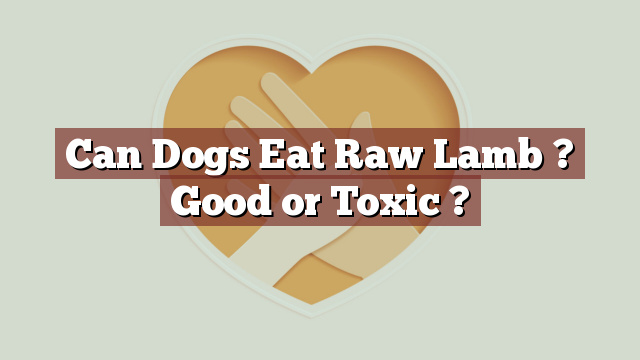Can Dogs Eat Raw Lamb? Good or Toxic?
When it comes to feeding our furry friends, it is crucial to be aware of the foods that are safe and beneficial for their health. One common question that arises is whether dogs can eat raw lamb. In this article, we will explore the nutritional value of raw lamb for dogs and determine whether it is safe or toxic for them.
Nutritional Value of Raw Lamb for Dogs: Essential Nutrients and Minerals
Raw lamb contains a range of essential nutrients and minerals that can be beneficial for dogs. Lamb is an excellent source of high-quality protein, which is essential for muscle development and repair. It also provides various vitamins such as vitamin B12, vitamin B6, and niacin, which are important for maintaining a healthy coat, promoting proper brain function, and supporting overall wellbeing.
Additionally, raw lamb is rich in minerals like zinc, iron, and selenium. These minerals play a vital role in supporting a strong immune system, aiding in healthy blood circulation, and promoting optimal growth and development.
Is Raw Lamb Safe or Toxic for Dogs? Myth vs. Fact
Yes, dogs can eat raw lamb. Contrary to some myths, raw lamb is not toxic for dogs, as long as it is handled and prepared properly. However, it is important to note that dogs have different digestive systems than humans, and raw meat can carry bacteria such as Salmonella or E. coli. Therefore, it is crucial to take precautions when feeding raw lamb to your dog.
It is advisable to source high-quality, fresh lamb from a reputable supplier to minimize the risk of contamination. Additionally, proper handling, storage, and hygiene practices must be followed to ensure the safety of both your dog and yourself.
Potential Risks or Benefits of Feeding Dogs Raw Lamb
Feeding dogs raw lamb can have potential benefits as well as risks. One of the main benefits is the high protein content, which can contribute to muscle development and overall health. Raw lamb can also be a good alternative for dogs with specific dietary requirements or allergies.
On the other hand, the risks associated with feeding dogs raw lamb mainly revolve around the potential bacterial contamination. Dogs may experience digestive issues, such as diarrhea or vomiting, if the lamb is not properly handled or cooked. Additionally, the bones in raw lamb can pose a choking hazard or cause damage to a dog’s teeth or digestive tract if not carefully monitored.
What to Do If Your Dog Eats Raw Lamb: Steps to Take and Signs to Monitor
If your dog accidentally consumes raw lamb, it is important to monitor their behavior and health for any adverse reactions. Keep an eye out for symptoms such as vomiting, diarrhea, abdominal pain, or lethargy. In case of any concerns or if your dog shows severe symptoms, it is recommended to consult a veterinarian immediately.
To prevent any potential risks, it is advisable to consult with your veterinarian before introducing raw lamb or any other new food into your dog’s diet. They can provide guidance based on your dog’s specific needs, health condition, and dietary requirements.
Conclusion: The Verdict on Feeding Dogs Raw Lamb
In conclusion, dogs can eat raw lamb. It offers various essential nutrients and minerals that can contribute to their overall health and wellbeing. However, it is crucial to handle and prepare raw lamb properly to minimize the risk of bacterial contamination. While raw lamb can be a suitable addition to a dog’s diet, it is always recommended to consult with a veterinarian to ensure the best nutrition and safety for your beloved pet.
Thank you for investing your time in exploring [page_title] on Can-Eat.org. Our goal is to provide readers like you with thorough and reliable information about various dietary topics. Each article, including [page_title], stems from diligent research and a passion for understanding the nuances of our food choices. We believe that knowledge is a vital step towards making informed and healthy decisions. However, while "[page_title]" sheds light on its specific topic, it's crucial to remember that everyone's body reacts differently to foods and dietary changes. What might be beneficial for one person could have different effects on another. Before you consider integrating suggestions or insights from "[page_title]" into your diet, it's always wise to consult with a nutritionist or healthcare professional. Their specialized knowledge ensures that you're making choices best suited to your individual health needs. As you navigate [page_title], be mindful of potential allergies, intolerances, or unique dietary requirements you may have. No singular article can capture the vast diversity of human health, and individualized guidance is invaluable. The content provided in [page_title] serves as a general guide. It is not, by any means, a substitute for personalized medical or nutritional advice. Your health should always be the top priority, and professional guidance is the best path forward. In your journey towards a balanced and nutritious lifestyle, we hope that [page_title] serves as a helpful stepping stone. Remember, informed decisions lead to healthier outcomes. Thank you for trusting Can-Eat.org. Continue exploring, learning, and prioritizing your health. Cheers to a well-informed and healthier future!

